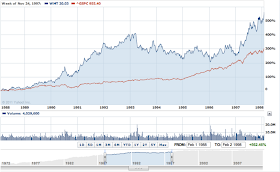--
Originally posted 8/25/11:
With Steve Jobs stepping down at Apple, there are plenty of questions about what comes next. Jobs is undisputedly the most influential CEO of the last decade and one of the most influential people of the last 35 years. Jobs' contributions to society have been extraordinary and today he is deservedly drawing comparisons to other great industrialists like Ford, Edison, Carnegie and Rockefeller. When the history books are written, it's likely that these comparisons will hold up.
While I wanted to run a stock chart comparison to these early 19th century industrialists, individual stock data from the early 20th century isn't easy to come by. Still, there are at least three iconic CEOs of the latter 20th century who can arguably be compared to Jobs: Disney, Walton and Gates. Here's a look at how each company's stock performed in the decade following its CEO's departure.
Each chart begins on the date that the CEO stepped down.
DIS
 |
| Click to Enlarge |
WMT
MSFT
What's striking is that in the case of DIS and WMT, each stock continued to massively outperform the S&P 500 for 6 and 5 years respectively after the departure Disney and Walton. Perhaps this is a testament to the bench of talent that a great CEO cultivates. However, after the 5-6 year mark, both stocks had prolonged periods of underperformance (for DIS at least partially due to the 1974 bear market). This may be an indication that a visionary CEO can continue to carry a company for years after leaving, but after a while, the company loses the benefit of that vision.
Of the three companies, only MSFT has underperformed the S&P 500 from the day that Gates stepped down. Of course at least part of this has been because of the collapse of the tech bubble (MSFT was trading at about 60x earnings at the time). Still, looking at the underlying earnings of MSFT and the gross mismanagement since Gates left, it is a testament to Gates' leadership that the company continues to enjoy top market share in the PC business.
Another primary reason for MSFT's poor performance has been because of the efforts of Jobs himself who arguably engineered an organic monopoly in high end consumer electronics. He will be missed for his vision, but we may not really know how much we miss him for another 5 years.



No comments:
Post a Comment
For compliance reasons, I don't post comments to the site, but I do like hearing from readers and am happy to answer any questions. Feel free to use the comment box to get in touch. Please leave an email address in your comment so that I can write back, or email me directly at Skrisiloff@avondaleam.com.